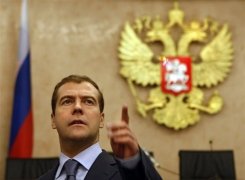
INVESTIGATIVE COMMITTEE UNVEILS “CONCEPTUAL DESIGN” FOR FIGHT AGAINST CORRUPTION
Publication: Eurasia Daily Monitor Volume: 5 Issue: 121
By:

Work on the national anti-corruption plan recently ordered by President Dmitry Medvedev (see EDM, June 18, May 21 and 28) is moving ahead. A spokesman for the Investigative Committee of the Prosecutor General’s Office (SKP), Vladimir Markin, told Interfax on June 25 that the SKP had elaborated and forwarded to the president’s National Anti-Corruption Council a “conceptual design” for the national anti-corruption plan. This conceptual design, he said, described the conditions that contributed to corruption and the corresponding measures to combat it. “The conception includes blocks characterizing the conditions that contribute to the appearance and growth of corruption, the main principles of state policy in the sphere of counteracting corruption, issues of organizing work for counteracting corruption, domestic and international experience in the fight against corruption, a mechanism for realizing the conception and a number of other provisions,” Markin told the news agency.
Noting that existing legislation did not include a “normative definition of corruption,” Markin said the SKP’s conceptual design envisaged a “systematic analysis” of current and draft legislation; improving the “legislative base” and bringing it in line with international standards and international agreements ratified by Russia; simplifying procedures for bringing officials who have immunity from prosecution to account; sharing anti-corruption knowledge and methods for exposing and assessing the level of corruption of public servants; and training specialists to expose corruption in all spheres of the state apparatus (including law-enforcement and judicial bodies).
Markin added that in order to realize these goals, the SKP’s approach called for measures aimed at “strengthening the ‘transparency’ of the activities of governmental bodies,” methods for ensuring that citizens’ complaints about corruption got a “qualified” and “objective” hearing and were acted on, a system of “incentives and protections” for citizens who provide reliable information about acts of corruption, and incentives designed to stimulate “anti-corruption behavior” among public servants.
In addition, said Markin, the SKP’s anti-corruption concept stated that public servants should receive salaries and benefits that “stimulate conscientious work and guarantee high prestige” both during their careers and in retirement. It also calls for a system of controls, including “technical” controls, over public servants aimed at warning about and preventing potential violations and abuses. These controls, Markin said, would include “financial control” of the income and expenditures of public servants and members of their families (Interfax, June 25).
Meanwhile, the newspaper Gazeta quoted Maksim Parshin, deputy director of the Ministry of Economic Development and Trade’s department for state regulation in the economy, as saying that the government was setting up a system under which every order and resolution issued by the government, including those already issued, would be checked by a team of experts to ensure that they did not contain loopholes that could be exploited for corrupt purposes. In the budget message to the government and parliament, which he signed on June 23 and which contains the main directions of budgetary policy for period from 2009 to 2011, President Medvedev indicated that he intended to close off another avenue for corruption. “In a number of cases, a practice has developed of levying all kinds of fees on the population for services guaranteed by the state and already paid for by the budget,” Medvedev said in the budget message. Gazeta noted that while the president did not cite concrete examples, “practically every Russian citizen could easily share a negative experience of dealing with bodies of power at any level” (Gazeta, June 25).
While Medvedev’s anti-corruption campaign is gaining momentum, some observers continue to express skepticism about its prospects for success. The reasons for this include the fact that anti-corruption drives are conducted from the top downward and there is a lack of emphasis on genuinely democratic checks and balances, including those provided by a free and independent press and an independent judiciary.
“Without free media the fight against corruption is impossible,” said Yelena Panfilova, head of the Russia office of Transparency International. “An official must understand that if revelatory material appears about him in the press, then a more worthy candidate will be chosen in his place. Our judges must be independent. And judges must be protected but at the same time bear responsibility for unlawful decisions. The fight against corruption requires income declarations from all officials and their families–from everyone who has the opportunity to convert his signature into money. At present, no one is seriously examining the declarations of officials–for example, for the existence of assets abroad–or keeping track of how a decision by an official affects his relatives’ business” (Gazeta, June 25).
Medvedev has called for an independent judicial system; and hopes for judicial reform were stirred last month when Yelena Valyavina, first deputy chairman of the Supreme Arbitration Court, stated publicly that the Kremlin had pressured and threatened the Russian judiciary to secure favorable rulings. The Supreme Arbitration Court’s chairman, Anton Ivanov, is a long-time associate of Medvedev (Washington Post, June 9).
Still, another Supreme Arbitration Court judge, Tatyana Neshataeva, stressed just how hard it would be to reform the judicial system. “It is difficult to be independent; not everyone can endure it,” she told a roundtable discussion at Moscow’s Institute of Contemporary Development on June 24. “The main reason why we cannot achieve independent courts is institutional. The internal construction of power is created according to the principle of execution and subordination; there is no legislative basis for these structures asserting independence. And the coming reform will change nothing, because it is a problem of mentality. Everyone wants to be a boss. Even the most democratic people who, when they find themselves in power, change, because it is all very sweet–the car, the flashing light [on top of the car], the position, giving orders. Man is a biological creature: he cannot resist this and he will always be suppressing others. That is precisely why those who will be doing the reform will not permit the courts to be independent” (Vremya novostei, June 25).




